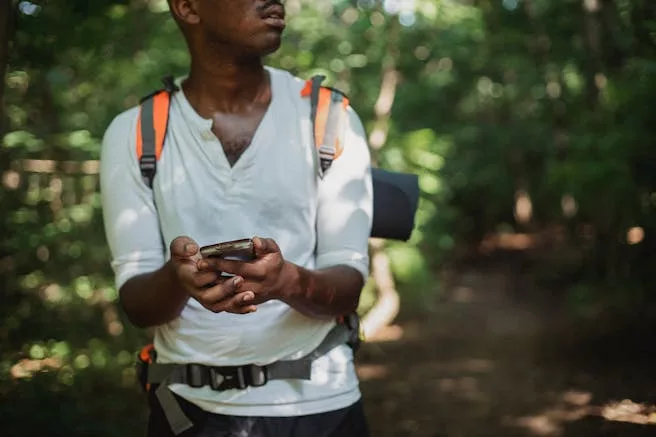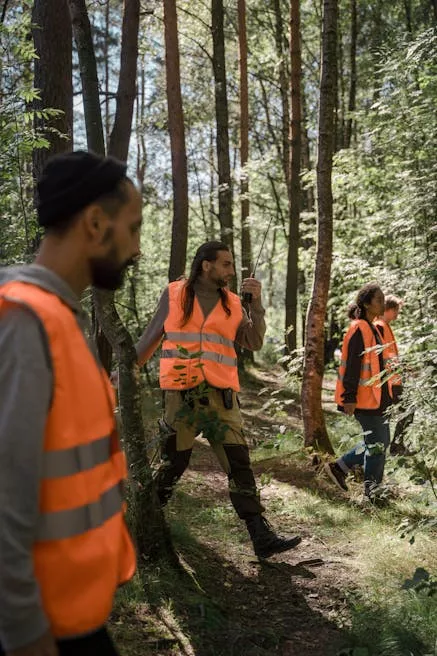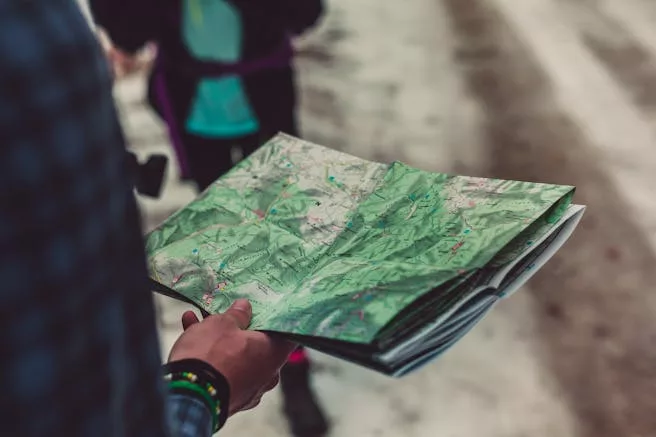
We recently had a lost hiker in the Snowy Mountains National Park in NSW. The search had dragged on for 13 days and with each passing day his chances of survival would have grown slimer and slimer. Thankfully, he was found 10 km from where he was last seen by his companions, by a group of hikers, a whole 13 days later. I like many, was relieved when I heard the news of his discovery and that he had survived. You can read the full and fascinating story here.
This incident has prompted me to write about what to do if you get lost hiking. Hopefully, we never have to follow this advice but safe hiking is about preparation and knowledge.
Stop and Stay Calm
The first thing to do is stop moving, take deep breaths, and assess your situation. When you panic you make poor decisions. Try the 4-7-8 breathing method: Breath in through your nose counting for 4 seconds, count for 7 holding your breath and breathe out through your mouth for 8 seconds. Doing this is few times will help calm you down, so you can think of your safest option.
Use the “S.T.O.P.” Method
- S – Stop: Stay where you are and avoid wandering further.
- T – Think: How did you get here? Can you backtrack safely? Take into consideration if you are doing a return or circuit hike. How long you have been hiking for. and how long do you have to finish the walk.? These factors will impact your decisions.
- O – Observe: Look around for landmarks, trails, or signs of other hikers. Check your map, compass, or GPS.
- P – Plan: Based on your observations, decide the safest course of action.
Stay Put (Unless You Have a Safe Exit Route)
In most cases, staying in one place is the best option. It makes it easier for rescuers to find you and prevents you from getting more lost or injured.
The following criteria will help you decide if you should stay put:
- If you’re completely unsure of your location
- If it’s close to dark, hiking in the dark will put you in more danger and you could risk injury.
- If you’re injured, you may not know the full extent of your injuries and do more harm or cause a more rapid decline in health.
- If you have limited water or supplies, moving will cause you to require water and food sooner.
- If you’re in difficult terrain (dense forest, cliffs, rivers). Moving on could put you at risk of injuring yourself.

When Should You Move?
- If you can safely retrace your steps to a known location. I record my hikes on an App which allows me to retrace my steps.
- If you see a visible trail or clear landmark.
- If you need to find water or shelter.
- If no one is searching after 24+ hours and you have the ability to self-rescue.
Tips to Help You Reach Safety
Try to Get Your Bearings
If you’re not in immediate danger, take time to figure out where you are. The following navigation tools may help you:
- Map & Compass – Check for landmarks, contour lines, or nearby features.
- GPS or Phone Apps – Use Google Maps, AllTrails, or Gaia GPS if you have signal.
- Sun Position – The sun rises in the east and sets in the west, which can help with direction.

Look for Signs of Trails or Civilization
- Footprints or bike tracks.
- Trail markers or signs. Hiking cairns, those pile of rocks, are used by hikers to mark trails.
- Running water (streams often lead to rivers, which may lead to roads).
Signalling for Help
Making yourself visible and audible increases the chances of being found quickly. Here are ways that you can signal for help.
- Whistle: Blow three short blasts (universal distress signal). All hikers should carry a whistle attached to their backpak for easy access.
- Fire: Smoke can be seen from a distance. Matches or a lighter to start a fire is also essential to carry.
- Mirror or Flashlight: Reflect sunlight to attract attention. I always have a head light that lives in my backpack, I check that it’s working prior to each hike.
- Bright Clothing: Lay out brightly colored gear to be seen from the air.
- Notes or Symbols: Leave messages with rocks, sticks, or paper. Consider what you can use to leave a message., a piece of charcoal from a burnt out tree can be used to write with.
If you have a PLB (Personal Locator Beacon) or satellite messenger (Garmin inReach, SPOT), activate it immediately. If hiking alone, which I don’t recommend, this is essential. If in a group, tactics such as ensuring you can see the person in front or behind you, stopping at intersections and having a designated tail help to prevent hikers getting lost.
Find Shelter & Conserve Energy
If you’re out overnight or in extreme weather, staying warm and dry is critical. Here are tips to help you with sheltering:
- Use a space blanket or sleeping bag for warmth. Space blankets are lightweight and small, another essential in your pack.
- Build a lean-to or use natural cover (caves, dense trees)
- Stay off cold ground by using leaves or clothing as insulation
These tips will help you to conserve energy:
- Avoid unnecessary movement, this will cause you to require more food and water.
- Ration food and water (but drink when needed to prevent dehydration). We can survive longer without food, but water is essential and becoming dehydrated can cause confusion.
- Stay dry to prevent hypothermia. When you body temperature drops below 95 degrees F or 35 C, your heart, nervous system and other organs can’t work as well as they should. If left untreated, this can cause your heart and respiratory systems to fail leading to death.
If You Must Move, Do It Wisely
If you determine that no one is coming and you need to self-rescue, move carefully and methodically. These strategies will help you do this safely:
- Follow a stream or river – It often leads to settlements or roads.
- Look for roads, power lines, or trails – These often lead to safety.
- Mark your path – Use rocks, sticks, or notes to avoid walking in circles.
- Move during daylight – It’s safer and easier to navigate.
My Final Thoughts
The best way to not get lost is to be prepared before your hike. Certain items should always be carried when hiking. My guide on what to pack will help with this list.
- Know the hike details, where you are going, the distance and how long it should take. This information can help you determine where you are or how far away safety is.
- A map & compass (and know how to use them).
- A fully charged phone or GPS device, I always carry a power bank and cord to recharge my phone.
- A whistle & signalling device.
- A headlamp or torch.
- Extra food, water, and clothing.
- A first aid kit. Ensure that it is stocked with items needed for when and where you are hiking. I always carry 2 snake bandages when hiking in the warmer months.
- A PLB or satellite communicator (if hiking in remote areas). As I usually hike in a group, I don’t carry one but our hike leaders always have one. Everyone is regularly accounted for on our hikes.
By staying calm, making smart decisions, and signaling for help, you greatly increase your chances of survival and rescue. Hopefully, you won’t need to use this advice and once again I am pleased that the lost hiker was found safe and alive. Happy and safe hiking!
Have you become lost on a hike? You can share your story here or ask a question.

This article is insightful and informative really like the way that you constructed and outlined this article in a clear understandable step-by-step guide on: What To Do If You Get Lost Hiking-Stop And Plan!
Like finding shelter & conserving energy: That person can survive longer without food but can’t do so without water because water plays a very important role in our body system. And the dryer you can remain when lost to keep up your body temperature is very essential.
Signal devices: such as Whistles, matches, or lighters to start a smoke, mirror, or flashlight. very vital tips.
Thank you for sharing this article.
Garfield
Garfield,
Thanks for the feedback. Hopefully, I never have to use my own advice.
This is such an important topic, and I’m glad the lost hiker was found safe after such a long ordeal. I’ve had a close call myself while hiking in dense forest terrain, and staying calm made all the difference. I used the S.T.O.P. method and was eventually able to backtrack safely to a known trail. In my experience, having a charged GPS device and a physical map as a backup is crucial, especially in remote areas. It’s always better to be over-prepared than underprepared when it comes to outdoor adventures. Great advice here—thanks for sharing!
Herman, Thank you for your comments. Lucky you were able to find your way back to a known trail. GPS and a back up map are essential when hiking, particularly in dense terrain.
For a Hiking lover like me this is valuable information. making the correct preparation before going for a hike is key it reduces the change of lost or worst, I Like how you have come up with the S.T.O.P method, by implementing this method you stay culm and level headed improving your chances of survive. This article shows step by step on what to do incase of an emergency, thank you for the clear steps provide I have learned something new today, you may have saved my life.
I am relieve to hear the hiker was found and nothing bad had happened except the getting lost part.
Hi Ravin, I’m glad you enjoyed the article. i hope you never need to use this information but it is a must to know.
Getting lost while hiking is a situation that requires both mental resilience and practical survival skills. While navigation tools like maps and GPS are essential, the ability to stay calm and make rational decisions often determines the outcome. Understanding natural navigation cues, like reading the sun’s position or recognizing how water flows downhill toward civilization, can be just as crucial as carrying a compass.
I think Technology can help a lot in such situations, but technology can let us down for various reasons such as loss of signal or charging. I believe keeping our survival skills sharp without total dependency on technology is essential.
Hi Thanks for your comments. It is true keeping our survival skills sharp is crucial not just for survival but for our mental capacity as we age.